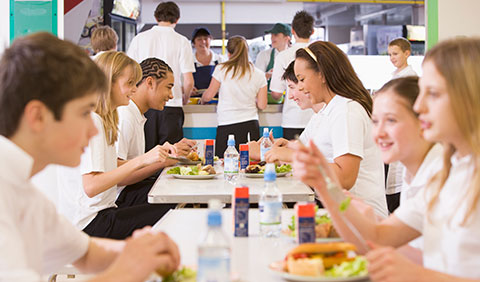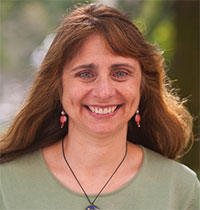Teaching Food and Nutrition for All

Sign the notification list below to receive program updates.
Format: Online (asynchronous)
Registration Fee: $395
Program Description:
Units Awarded:
24 clock hours or 24 CTLEs
Group/Team Discount (5 or more): 25% off the registration fee, please contact cps@tc.columbia.edu to register
The Scholarships for people who live or work in New York State have all been awarded
Teaching food and nutrition might be viewed as the single most important educational activity of a society; if persons do not learn to obtain and consume food so as to sustain themselves and their dependents, all other learnings are irrelevant.
— Dr. Joan Dye Gussow
Overview
“We are what we eat.” This statement is as overused as it is true. What your students eat impacts their ability to concentrate today and their health for the rest of their lives. But, how do we teach about food and nutrition to inspire real change? This course gives you the tools and confidence to empower your students.
You will explore your relationships with food, healthy eating, and your memories — good and bad — of school lunch. You will investigate the challenges of our current food supply. You will realize why education about food and nutrition is essential for today’s students, because they are tomorrow’s adults facing crucial decisions about how we produce and consume food in our changing world.
Throughout this course, we demonstrate activities, share resources, and provide curricula that can be used in school gardens, cooking activities, field trips, and cafeteria tastings. In this course you also learn how learning about food and nutrition can meet standards in science, social studies, literacy, math, art, health and other subjects. The course ends with step-by-step guidance to create a food and nutrition education plan for your students.
Faculty

Pam Koch works at the intersection of sustainable food systems and nutrition education. She has written, evaluated, and conducted professional development for several curricula including: the Linking Food and the Environment (LiFE) curriculum series: Growing Food; Farm to Table & Beyond, and Choice, Control & Change; Food Day School Curriculum; In Defense of Food Curriculum; Art & Healthy Living with Studio in a School, and Seed to Plate with GrowNYC. Pam was part of the team who developed the Garden Resource Education and Environment Nexus (GREEN) Tool to create school gardens that are well-integrated into the curriculum and culture. She has led several evaluations including Edible Schoolyard NYC, FoodCorps, and Wellness in the Schools. She was part of the School Food Focus team who is developing Recipes for Food System Change, professional development modules for school food service to procure more sustainable, regional, whole, and healthful foods. Pam is a co-author with Dr. Isobel Contento of the textbook, Nutrition Education: Linking Research, Theory, and Practice (4th Edition, 2021).
At Teachers College Columbia University, she is the Mary Swartz Rose Associate Professor of Nutrition and Education. She is also the founding Executive Director of the Laurie M. Tisch Center for Food Education & Policy and a Co-Director of the Center for Sustainable Futures. Finally, Pam loves to garden and cook and has been a member of Roxbury Farm CSA for over 25 years. Pam brings passion, dedication, and her flare for graphic design to all she does.
Who Should Attend?
This course is open to anyone who is or wants to teach school students about food and nutrition, whether through formal curriculum or more informally. The course is open to:
- All K–12 educators, resources and curricula will be shared that are appropriate for elementary, middle, and high school students.
- Pre-service teachers who attend undergraduate or graduate programs.
- Anyone working or volunteering with a non-profit or for-profit organization that conducts gardening, cooking or any food and nutrition education in schools, whether during the school day, in after school programs, or at community-based organizations are welcome.
- People who work for government funded programs such as Extension and Supplemental Nutrition Assistance Program Education (SNAPEd).
If you have educated school students about food and nutrition before, or this is a new area for you, everyone will learn evidence-based strategies and best practices (that include gardening and cooking) to inspire students to want to eat well, build practical knowledge and skills that increase confidence and commitment to make healthy food choices, and learn to navigate the challenges of our current food environment and advocate for positive change in their community and in the world.
Course Outline
Over the three weeks of this course, we will cover five topics through engaging mini-lectures, online activities, readings, assignments, and discussion groups.
Topic 1: Food for Thought: Reflecting Back and Thinking Ahead
Our personal experiences with food will influence what and how we teach about food. This course begins with reflecting on our own eating histories, what we learned about food and nutrition as students, and our experiences with school meals. Participants will think about what kind of experiences (including gardening, cooking and exploring food justice) can make a real difference in their students’ lives.
Topic 2: Why Food and Nutrition Education for All Matters
Today’s students are inheriting a world with many challenges that relate to food. Type 2 diabetes and other preventable lifestyle-related diseases that decrease quality of life and have high healthcare costs are on a steady rise. Many of our communities, particularly low-income communities and BIPOC (Black Indigenous and People of Color) communities lack access to health-promoting foods, yet are "food swamps'' filled with unhealthy foods. How our food is grown and processed is affecting climate change and damaging our environment. Yet, there are ways to produce enough nourishing food for all while also mitigating climate change. Why do we lack strong public policies to support these transitions? When students understand our food system, they can become active participants in these important societal debates.
Topic 3: Biting into Food and Nutrition Education
Participants "try out" many food and nutrition education activities, with activities appropriate from K-12th grade. These activities include gardening, cooking, analyzing our current food supply, understanding injustices related to food and how to move toward food justice, learning about the nutritional content of various foods, and much more. Participants also learn evidenced-based strategies for how food and nutrition education can enhance students' intrinsic motivation; empower students to eat well; provide practical and confidence building knowledge and skills; and learn how to navigate the challenges of our current food environment. Participants also learn how to help students become advocates for positive changes toward more sustainable, equitable, and healthy food futures for all.
Topic 4: School Meals: Opportunities and Challenges
Participants learn about our national school meal program. They learn how this program has evolved since its inception in 1946, and the opportunities and challenges school meals face today. Participants discuss why school lunch is not a more connected, integral part of the school day. Then participants learn about exciting initiatives happening around the United States and around the world that are transforming school food to provide freshly prepared and scratch-cooked, health-promoting school meals, as well as how school meals can be directly connected to food and nutrition education.
Topic 5: Making Food and Nutrition Education Happen in Your Classroom, Your School, Your Community
Finally, participants create their own concrete food and nutrition education plan (lessons, ideas, resources to use, partners to work with) ready to use with their students.
Helping students to "take a better bite" each and every day.